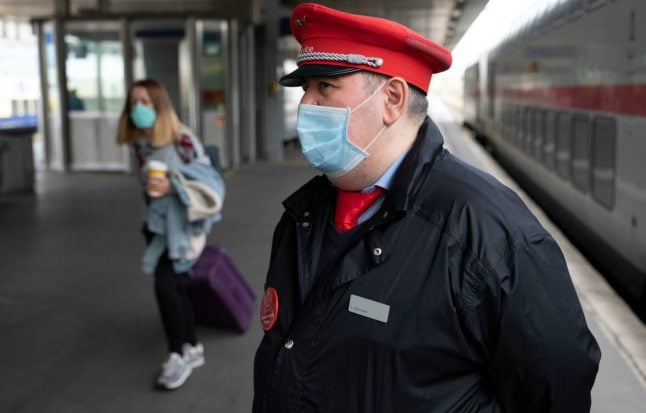At the height of the coronavirus crisis, Germany’s rail operator Deutsche Bahn experienced an unprecedented slump in passenger numbers.
Up to 90 percent fewer passengers took advantage of its services, with ICE high speed trains in particular appearing almost completely empty on some days.
Germany issued advice in March urging people not to travel unless it’s essential. According to the government, that advice is still in place at least until the next phase of emerging from lockdown, which will begin after June 5th.
But as public life has been opening up again, including the tourism industry, more people are using public transport and are planning trips within the country.
Here’s how Deutsche Bahn is gearing up to welcome more travellers and ensure safety.
READ ALSO: Deutsche Bahn to double cleaners on trains and make toilet stations free
App to warn people about full trains
More people have been travelling by train since the coronavirus lockdown restrictions were relaxed earlier this month. And with another holiday weekend coming up (Monday June 1st is a pubic holiday for the Whitsun celebration), travel bosses are expecting residents to venture further from their homes.
“Looking ahead to the Whitsun weekend, we are noticing that we're taking a slight step up,” said Berthold Huber, Passenger Transportation Director at Deutsche Bahn (DB).
According to Huber, trains are currently 30 to 40 percent booked for the weekend. Normally, the figure at Whitsun is more than 55 percent, however, it's a clear increase compared to April.
“So things are slowly starting to pick up,” Huber said. “We are noticing that people are beginning to become a bit more confident and book longer-term again.”
DB wants to use its app to better control the flow of passengers so that dangerous busy situations on trains can be avoided as much as possible, reported Spiegel.
Even if a train is only half booked (at 50 percent capacity), a 'high capacity' (hohe Auslastung) factor will be displayed on the booking app to customers. It is hoped that passengers will then switch to another journey instead. If bookings continue to rise, ticket sales can also be suspended for a particular train.
This should enable passengers to access less frequented connections and prevent people from travelling on trains that are too crowded, says DB.
No reservation requirement
Deutsche Bahn bosses have decided against making a general reservation requirement for all passengers, which some transport politicians had called for in recent weeks.
That means, technically, those who go to the station can still board a busy train even if the app is no longer allowing reservations for it.
 Photo: DPA
Photo: DPA
However, DB hopes that people will avoid this scenario.
It will also be possible to reserve seats next to each other. Bosses have decided not to block off every second seat. This would have made it impossible for families to reserve seats next to each other.
Disinfection spray at railway stations
Instead, DB has opted for increased cleaning and disinfection of carriages. As the Local reported, the number of cleaning staff on trains is set to double to 500 by July,
Disinfection spray is also being made available at stations.
Wearing masks
Deutsche Bahn has issued an urgent recommendation for all passengers to wear protective masks on trains and in the station.
Across Germany wearing masks on public transport is compulsory at the moment, but not every customer follows this rule.
People are being urged to wear a covering over their mouth and nose to help prevent the spread of Covid-19. They are also urged to wash hands regularly and avoid travelling if they feel ill.
READ ALSO: What you need to know about travelling within Germany this summer
More space
The operator is also increasing its long-distance travel offering.
On the routes between large cities, such as between Berlin and the Ruhr area and further south, double-decker trains instead of single trains will be used again. This will increase the number of seats available.
Huber said he's confident that the passenger volume can be well managed with these measures.
Luring passengers away from cars
Deutsche Bahn is also trying hard to fight competition from private cars, which many residents consider to be a less risky travel option in corona times.
Measures such as the app are designed to lure customers who may be wary about travelling back onto trains.
Deutsche Bahn has been hit particularly hard by the corona crisis. However, the company has received a multibillion-euro-rescue package from the government to weather the effects of the crisis.
Is it enough?
The Federation of German Consumer Organisations (Verbraucherzentrale Bundesverband), has raised concerns about the measures, saying they may not be enough.
They said problems with air conditioning systems for example would have to be addressed immediately.
It also called for more staff to be deployed on the trains to help with problems. “Simply relying on social control will not be enough and can make rail travel stressful,” said the federation.



 Please whitelist us to continue reading.
Please whitelist us to continue reading.
Member comments